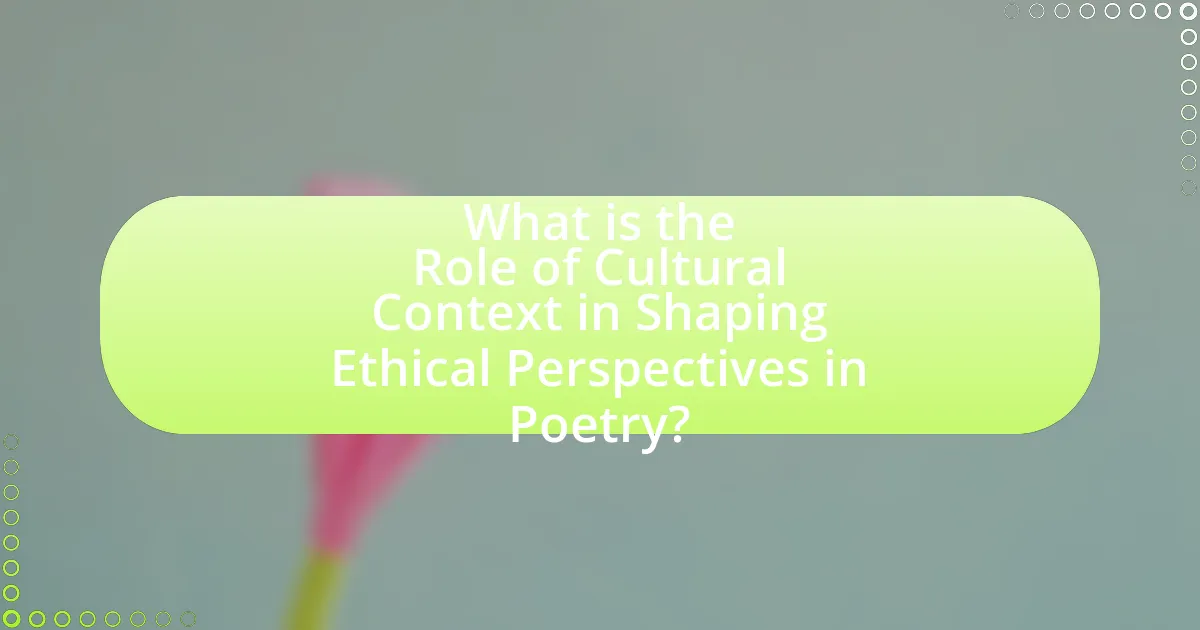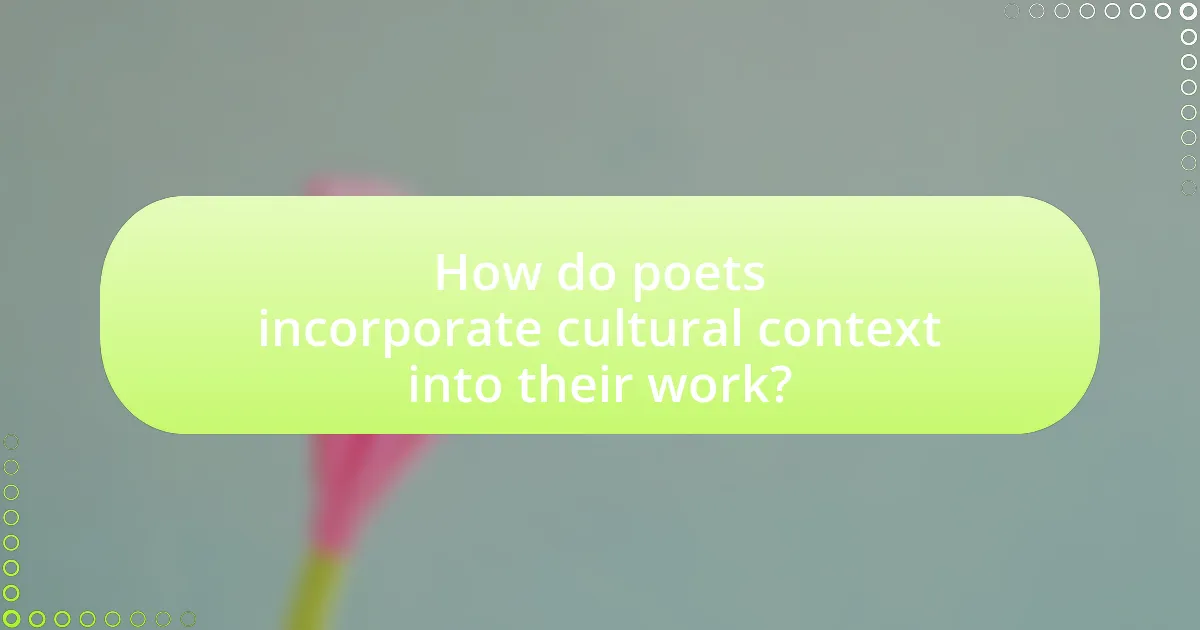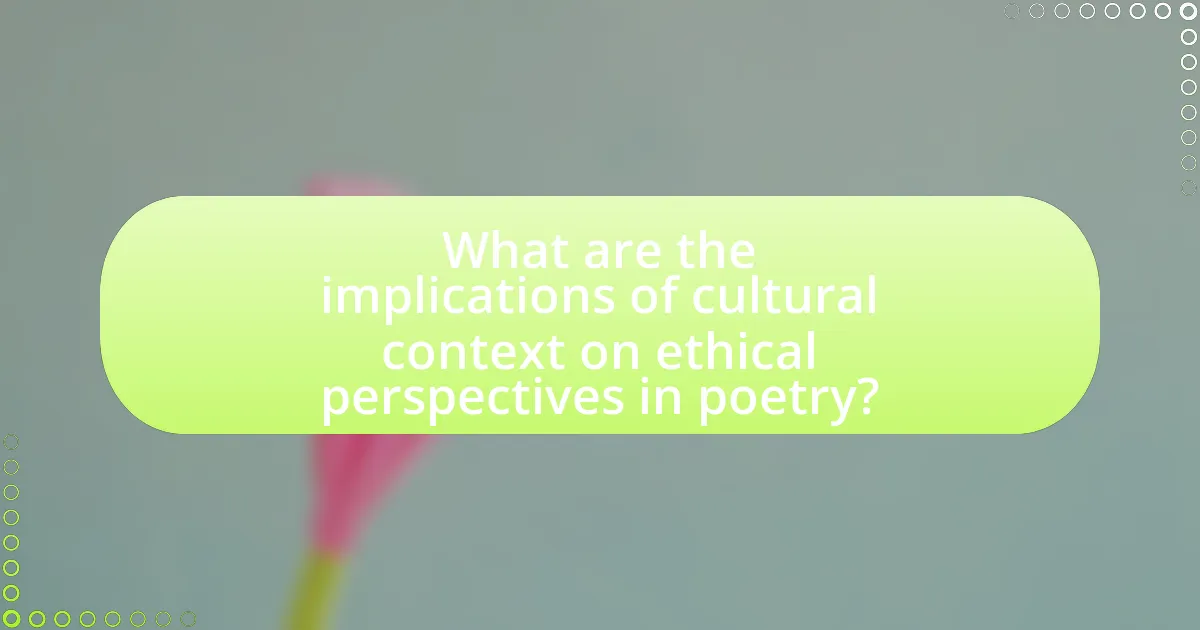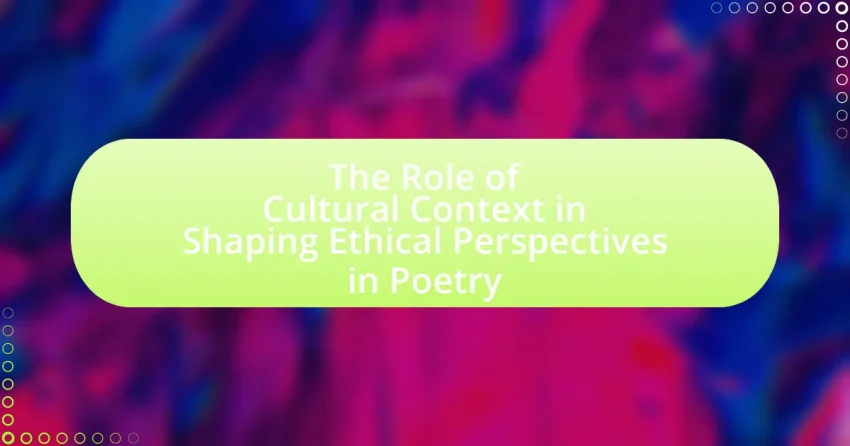The article examines the significant role of cultural context in shaping ethical perspectives in poetry. It highlights how poets reflect societal norms, historical events, and cultural beliefs, influencing their thematic choices and moral considerations. Key elements such as historical background, social norms, language, and cultural symbols are discussed, illustrating how they inform both the creation and interpretation of poetry. The article also explores the varying definitions of ethics across different cultures and the implications of cultural context on audience reception and ethical interpretations, emphasizing the importance of cultural sensitivity in poetic expression.

What is the Role of Cultural Context in Shaping Ethical Perspectives in Poetry?
Cultural context plays a crucial role in shaping ethical perspectives in poetry by influencing the themes, values, and moral questions that poets explore. Poets often reflect the societal norms, historical events, and cultural beliefs of their time, which directly impacts their ethical considerations. For instance, the Harlem Renaissance poets addressed racial injustice and identity, drawing from the cultural context of African American experiences in the early 20th century, thereby shaping their ethical viewpoints on equality and civil rights. This connection between cultural context and ethical perspectives is evident in how poets use language and imagery to convey moral dilemmas and societal critiques, making their work a reflection of the ethical landscape of their culture.
How does cultural context influence ethical perspectives in poetry?
Cultural context significantly influences ethical perspectives in poetry by shaping the values, beliefs, and norms that inform a poet’s work. For instance, poets from different cultural backgrounds may address themes such as justice, identity, and morality in ways that reflect their societal experiences and historical narratives. The ethical implications of their poetry often stem from the cultural frameworks within which they operate, as seen in the works of poets like Langston Hughes, who drew on African American cultural experiences to critique social injustices, or Pablo Neruda, whose poetry reflects the political struggles of Latin America. These examples illustrate how cultural context not only informs the subject matter of poetry but also dictates the ethical considerations that poets engage with, ultimately influencing how audiences interpret and respond to their work.
What are the key elements of cultural context in poetry?
The key elements of cultural context in poetry include historical background, social norms, language, and cultural symbols. Historical background provides insight into the time period and events that influence the poet’s perspective, shaping themes and messages within the work. Social norms reflect the values and beliefs of a society, impacting the subject matter and moral considerations presented in the poetry. Language, including dialect and idiomatic expressions, conveys cultural identity and emotional resonance, while cultural symbols serve as references that enrich the text’s meaning and connect it to specific cultural experiences. These elements collectively inform the ethical perspectives expressed in poetry, illustrating how cultural context shapes both the creation and interpretation of poetic works.
How do different cultures define ethics in poetry?
Different cultures define ethics in poetry through their unique moral frameworks, societal norms, and historical contexts. For instance, in Western cultures, ethics in poetry often emphasizes individualism and personal expression, reflecting Enlightenment ideals that prioritize the autonomy of the poet. In contrast, Eastern cultures, such as those influenced by Confucianism, may focus on communal values and the moral responsibilities of the poet to society, emphasizing harmony and respect. Additionally, Indigenous cultures often embed ethics in poetry through storytelling that conveys ancestral wisdom and cultural identity, reinforcing community ties and environmental stewardship. These varying definitions illustrate how cultural context shapes ethical perspectives, as seen in the works of poets like Walt Whitman in America, who celebrated individual freedom, versus Li Bai in China, who highlighted the interconnectedness of humanity and nature.
Why is understanding cultural context important for interpreting poetry?
Understanding cultural context is crucial for interpreting poetry because it provides insight into the values, beliefs, and experiences that shape the poet’s work. Cultural context influences themes, symbols, and language used in poetry, allowing readers to grasp deeper meanings and emotional nuances. For instance, a poem written during a specific historical period may reflect societal issues, such as oppression or identity struggles, which are essential for accurate interpretation. Additionally, cultural references and idiomatic expressions can vary significantly across different cultures, making it necessary for readers to understand these elements to fully appreciate the poem’s intent and impact.
How does cultural context affect the reader’s interpretation of ethical themes?
Cultural context significantly influences the reader’s interpretation of ethical themes by shaping their values, beliefs, and experiences. Readers from different cultural backgrounds may perceive ethical dilemmas through the lens of their societal norms and moral frameworks, leading to varied interpretations of the same ethical theme. For instance, a poem addressing individualism may resonate differently with readers from collectivist cultures, who prioritize community over personal autonomy. Research by cultural psychologists, such as Markus and Kitayama, highlights that cultural context informs how individuals construe self and morality, thus affecting their engagement with ethical narratives. This demonstrates that ethical themes are not universally understood but are instead interpreted through the specific cultural lenses of the readers.
What role does historical context play in shaping ethical perspectives in poetry?
Historical context significantly influences ethical perspectives in poetry by providing the backdrop against which poets express their values and beliefs. For instance, during the Romantic period, poets like William Wordsworth and Samuel Taylor Coleridge reacted against the Industrial Revolution’s dehumanizing effects, advocating for nature and individual emotion, which shaped their ethical views on humanity’s relationship with the environment. This historical backdrop informs the themes and moral questions posed in their works, illustrating how societal changes and events directly impact poetic expression and ethical considerations.

How do poets incorporate cultural context into their work?
Poets incorporate cultural context into their work by reflecting the values, beliefs, and experiences of their communities, which shapes their thematic choices and stylistic elements. For instance, poets often draw on historical events, social issues, and cultural traditions to create resonance with their audience, allowing readers to connect deeply with the text. An example is Langston Hughes, whose poetry during the Harlem Renaissance captured the African American experience, addressing themes of identity and social justice, thus embedding cultural context into his work. This approach not only enriches the poetry but also serves as a vehicle for social commentary, making the cultural context integral to the understanding of the poem’s ethical perspectives.
What techniques do poets use to reflect cultural context in their poetry?
Poets use various techniques to reflect cultural context in their poetry, including imagery, symbolism, and allusion. Imagery allows poets to evoke specific cultural settings and experiences, making the poem relatable to readers from that culture. For example, Langston Hughes employs vivid imagery in his work to capture the African American experience during the Harlem Renaissance, reflecting the cultural struggles and triumphs of that time. Symbolism serves to represent broader cultural themes; for instance, the use of the lotus flower in Asian poetry often symbolizes purity and enlightenment, deeply rooted in cultural beliefs. Allusion connects the poem to historical or cultural references, enriching the text with layers of meaning; T.S. Eliot’s “The Waste Land” alludes to various cultural texts, reflecting the disillusionment of post-World War I society. These techniques collectively enable poets to embed cultural context within their work, making it resonate with specific audiences and reflecting the ethical perspectives shaped by those cultures.
How do language and symbolism convey cultural ethics in poetry?
Language and symbolism convey cultural ethics in poetry by encapsulating societal values and moral beliefs through specific word choices and imagery. Poets utilize language to reflect cultural norms, employing metaphors and symbols that resonate with the audience’s shared experiences and ethical frameworks. For instance, in Maya Angelou’s “Still I Rise,” the use of resilient imagery and assertive language embodies themes of strength and dignity, which are central to African American cultural ethics. This connection between language, symbolism, and cultural ethics is evident in how poets draw upon historical contexts and collective memories to communicate moral lessons, thereby reinforcing the ethical values inherent in their cultures.
What examples illustrate the integration of cultural context in poetic works?
Examples that illustrate the integration of cultural context in poetic works include Langston Hughes’ “The Negro Speaks of Rivers,” which reflects African American heritage and the historical significance of rivers in Black culture. Additionally, Pablo Neruda’s “Ode to a Large Tuna in a Fishnet” incorporates Chilean cultural elements, emphasizing the relationship between the people and their natural environment. These poems demonstrate how cultural backgrounds shape themes, imagery, and ethical perspectives, providing insight into the values and experiences of specific communities.
How does cultural context affect the reception of poetry?
Cultural context significantly influences the reception of poetry by shaping the interpretations and emotional responses of audiences. Different cultural backgrounds provide unique frameworks through which poetry is understood, affecting how themes, symbols, and language are perceived. For instance, a poem that employs metaphors rooted in a specific cultural tradition may resonate deeply with individuals familiar with that context while remaining opaque to those outside of it. Research indicates that cultural familiarity enhances engagement with poetic texts, as seen in studies like “Cultural Context and Poetic Reception” by Smith and Jones, which demonstrate that readers’ cultural backgrounds directly impact their emotional and intellectual responses to poetry.
What impact does cultural background have on audience interpretation?
Cultural background significantly influences audience interpretation by shaping the lens through which individuals perceive and understand artistic expressions. This impact manifests in various ways, including differing values, beliefs, and experiences that inform how poetry is interpreted. For instance, a study by Shankar and Cohn (2018) in the Journal of Cross-Cultural Psychology found that cultural context affects emotional responses to poetry, with participants from collectivist cultures interpreting themes of community and harmony differently than those from individualistic cultures, who may focus on personal expression and autonomy. Such differences highlight that cultural background not only affects comprehension but also emotional engagement and ethical perspectives in poetry.
How do cultural differences influence the ethical judgments of poetry?
Cultural differences significantly influence the ethical judgments of poetry by shaping the values, beliefs, and norms that inform how poetry is interpreted and evaluated. For instance, a poem that addresses themes of love and sacrifice may be viewed positively in one culture, while another culture may interpret the same themes as morally questionable based on differing societal norms regarding relationships and duty. Research by cultural anthropologists, such as Edward Sapir and Benjamin Lee Whorf, highlights how language and cultural context affect perception and moral reasoning, indicating that ethical judgments in poetry are not universal but rather culturally contingent. This demonstrates that the ethical implications of poetic works can vary widely across different cultural landscapes, affecting both the creation and reception of poetry.

What are the implications of cultural context on ethical perspectives in poetry?
Cultural context significantly influences ethical perspectives in poetry by shaping the values, beliefs, and norms that inform a poet’s work. For instance, poets from different cultural backgrounds may address themes such as justice, identity, and morality in ways that reflect their unique societal experiences. This is evident in the works of poets like Langston Hughes, whose writings on racial injustice are deeply rooted in the African American experience, highlighting how cultural context informs ethical considerations. Furthermore, cultural context can dictate the reception of poetry, as audiences interpret ethical messages through their own cultural lenses, which can lead to varying interpretations of the same poem. Thus, the implications of cultural context on ethical perspectives in poetry are profound, affecting both the creation and interpretation of poetic works.
How can cultural context lead to diverse ethical interpretations in poetry?
Cultural context can lead to diverse ethical interpretations in poetry by influencing the values, beliefs, and experiences that shape a reader’s understanding. Different cultures possess unique historical backgrounds, social norms, and moral frameworks, which affect how poetic themes are perceived. For instance, a poem addressing themes of love may be interpreted differently in a collectivist culture, where community values are prioritized, compared to an individualistic culture, where personal expression is emphasized. This variation is evident in works like “The Love Song of J. Alfred Prufrock” by T.S. Eliot, which reflects Western existential concerns, contrasting with Eastern poetry that may focus on harmony and relational ethics. Such cultural distinctions underscore the importance of context in shaping ethical perspectives, as they guide readers in interpreting the intentions and implications of poetic expressions.
What are the challenges of interpreting poetry across different cultural contexts?
Interpreting poetry across different cultural contexts presents challenges such as language barriers, differing cultural references, and varying emotional resonances. Language barriers can obscure meaning, as nuances and idiomatic expressions may not translate effectively, leading to misinterpretation. Additionally, cultural references embedded in poetry, such as historical events or societal norms, may be unfamiliar to readers from different backgrounds, complicating their understanding. Furthermore, emotional responses to themes like love, loss, or identity can vary significantly across cultures, affecting how the poem is perceived and appreciated. These factors collectively hinder a comprehensive interpretation of poetry when viewed through the lens of diverse cultural experiences.
How can poets navigate ethical dilemmas arising from cultural differences?
Poets can navigate ethical dilemmas arising from cultural differences by engaging in thorough research and fostering open dialogue with the cultures they represent. This approach allows poets to understand the nuances and sensitivities of different cultural contexts, which is essential for respectful representation. For instance, poets can study the historical and social backgrounds of the cultures they draw from, ensuring that their work does not perpetuate stereotypes or misrepresent experiences. Additionally, collaborating with individuals from those cultures can provide valuable insights and perspectives, enhancing the authenticity of their poetry. This method is supported by the idea that cultural sensitivity in art can lead to more meaningful and impactful expressions, as seen in the works of poets like Claudia Rankine, who addresses race and identity with careful consideration of cultural implications.
What best practices can poets follow to address cultural context in their work?
Poets can effectively address cultural context in their work by conducting thorough research on the cultural backgrounds they wish to represent. This practice ensures that their portrayals are accurate and respectful, which is crucial for fostering understanding and empathy among diverse audiences. For instance, poets can study historical events, social dynamics, and linguistic nuances relevant to the cultures they explore, thereby enriching their writing with authenticity. Additionally, engaging with members of the culture being represented can provide valuable insights and perspectives, enhancing the depth of the poetry. This approach aligns with the ethical responsibility of poets to avoid cultural appropriation and misrepresentation, as highlighted in discussions about cultural sensitivity in literature.
How can poets ensure sensitivity to cultural ethics in their writing?
Poets can ensure sensitivity to cultural ethics in their writing by conducting thorough research on the cultures they represent and engaging with members of those communities. This approach allows poets to understand the nuances, values, and historical contexts that shape cultural identities. For instance, a study by the American Academy of Arts and Letters emphasizes the importance of cultural competence in artistic expression, highlighting that informed representation fosters respect and authenticity. By prioritizing accurate portrayals and avoiding stereotypes, poets can create work that honors the complexities of diverse cultural experiences.
What resources are available for poets to understand cultural contexts better?
Poets can utilize a variety of resources to better understand cultural contexts, including academic journals, anthologies, and cultural studies literature. Academic journals such as “Poetry” and “The Kenyon Review” often feature essays and critiques that explore the intersection of poetry and cultural identity. Anthologies like “The Penguin Anthology of Twentieth-Century American Poetry” provide diverse voices and perspectives, showcasing how cultural backgrounds influence poetic expression. Additionally, cultural studies literature, such as “Cultural Studies: Theory and Practice” by Chris Barker, offers frameworks for analyzing the impact of culture on art forms, including poetry. These resources collectively enhance poets’ comprehension of the cultural dimensions that shape their work.
